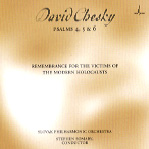It would be easy to criticize these sincere and competent efforts–three orchestral “psalms” in memory of the “victims of the modern Holocausts”–for their wanting of context and structure, their sense of randomness in organization of ideas, and for lack of true development, instead relying on repetition of a single thematic subject (or maybe two) as if to say “this is the theme, this is the theme, get it?” And yet, as a composer myself, I understand the compelling nature of creative practice to one open to its call. You have ideas–or they come to you–and you have to do something with them. American composer David Chesky, who’s certainly not a novice by any means, obviously has felt a compulsion to write these very deeply expressive, tense, poignant, and at times wrenching tributes to human suffering, and his method, however unrefined, is to utilize the tools and techniques requiring mastery of the classical orchestra, which also happens to be the territory of some of history’s greatest musical geniuses. And when similar subject matter has been embraced far more profoundly by composers such as Shostakovich, Britten, Gorecki, and Kancheli, any comparison resigns Chesky’s work to a field far apart.
Certainly, Chesky’s intention in writing these pieces wasn’t to stand shoulder to shoulder with those masters, and that’s my point. These very listenable, slow-moving, weighty, dense-textured works enamored of darker string and brass colors and interwoven with respectable if not especially memorable melodies, simply stand as personal utterances of hard-felt emotions and offer a plea for humankind to pursue “the good in us” rather than evil, “before one too many holocausts makes it too late.” The musical language is fraught with the syntax of the Shostakovich Eighth string quartet (even the theme of the first psalm sounds similar) and with the harmonic techniques of Shostakovich and the aforementioned Kancheli and Gorecki–and even a bit of Ives. In the last psalm, titled Rage and Despair, we are reminded more of adventure film soundtracks, the music disconnected from its critical visual information, than of the more self-contained or purposefully, pointedly abstract modern symphonic repertoire. Cellist Ján Slávik makes a fine contribution with his lovely, sensitively “sung” solo passages, and the Slovak Philharmonic musicians respond to conductor Stephen Somary as alertly and respectfully and energetically as any hopeful composer has any right to expect. The recording is alternately (and strangely) full-bodied and present and somewhat dampened or distant, but this is not a major hindrance to comfortable listening. There are essentially no liner notes–nothing to explain the connection between the use of the psalm titles and the music itself.
































